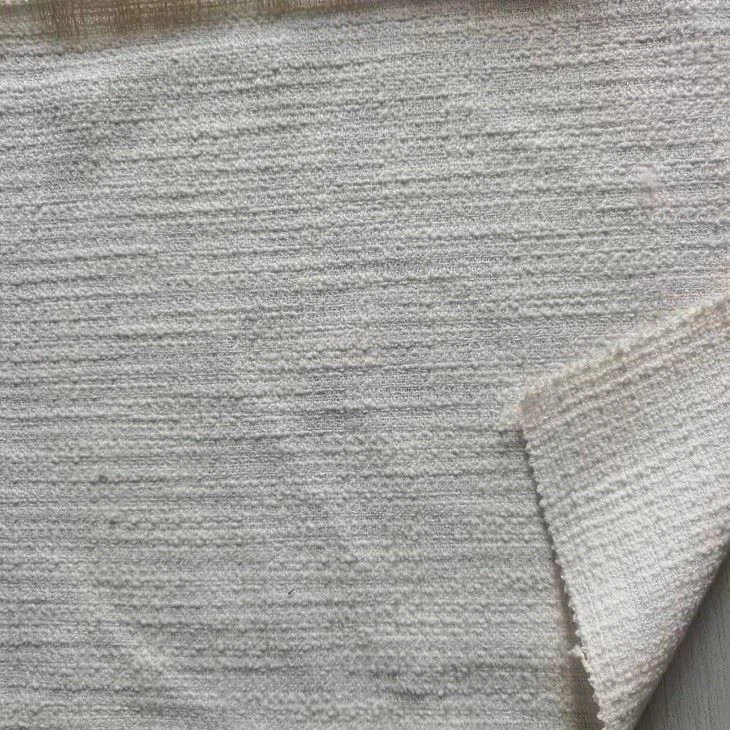Organic cotton twill fabric
Organic Cotton Twill Fabric is a premium eco-friendly material made from 100% organic cotton, crafted through a refined twill weave. This fabric combines the natural comfort of organic cotton with the distinctive texture of twill weave, offering exceptional durability and aesthetic appeal, making it the perfect choice for high-end fashion designs.
Key Features
- Eco-Friendly Material
- Superior Durability
- Comfort and Breathability
- Excellent Dyeing Performance
- Soft Hand Feel
Special Techniques and Differences from Regular Fabrics
- Organic Farming: Unlike regular cotton, organic cotton is grown without the use of any chemical pesticides or fertilizers. This not only protects the soil and water resources but also reduces health risks for farmers and end-users.
- Fine Weaving: Organic Cotton Twill Fabric uses a high-density twill weave, which is more durable and aesthetically pleasing compared to the plain weave commonly used in regular fabrics.
- Natural Dyeing: We use eco-friendly dyes to treat the fabric, ensuring rich and long-lasting colors while minimizing environmental impact. Regular fabrics often use chemical dyes, which may result in less durable colors and potential skin irritation.
- Chemical-Free Processing: No chemical softeners or bleaches are used during production, preserving the natural properties of the cotton fibers and ensuring the fabric's skin-friendliness and natural soft touch.
Available clothing types
- Cotton twill dress khaki
- Eco cotton twill jacket earthy brown
- Paneled cotton twill trousers l Oilcloth
- Women's Herringbone Twill Short Sleeve Utility Jumpsuit

Application scope
Organic Cotton Twill Fabric's unique properties make it ideal for high-end fashion and home textiles:
High-End Fashion: Its elegant twill texture and exceptional durability make it the ideal choice for outerwear, jackets, and pants, providing both warmth and style.
Casual Wear: The soft and comfortable hand feel and excellent breathability make it perfect for casual pants, skirts, and dresses, enhancing everyday comfort.
Children’s Apparel: The organic cotton material is naturally eco-friendly and chemical-free, making it particularly suitable for children's and baby clothing, protecting delicate skin.
Loungewear and Sleepwear: Its soft, breathable, and moisture-absorbing properties make it an ideal fabric for loungewear and sleepwear, offering ultimate comfort.
Professional Uniforms: Its durability and tear resistance make it suitable for various professional uniforms, such as workwear and school uniforms, ensuring long-lasting wear.
Frequently Asked Questions (FAQs)
Is Organic Cotton Twill Fabric suitable for high-end fashion?
- Absolutely. Its elegant twill texture and superior dyeing performance make it ideal for high-end fashion designs.
Does organic cotton twill shrink?
- Organic cotton twill may experience slight shrinkage upon the first wash. It is recommended to allow for some extra fabric when purchasing and follow care instructions properly.
Is this fabric suitable for baby clothing?
- Yes, it is. Organic cotton is naturally eco-friendly and chemical-free, making it perfect for baby clothing.
How can I order specific colors of organic cotton twill fabric?
- We offer custom dyeing services. You can choose specific colors based on your requirements. Please contact our customer service for more information.
Is Organic Cotton Twill Fabric durable?
- Made with high-quality organic cotton yarns and twill weave, it offers excellent durability and tear resistance, suitable for high-stress garments.
Is this fabric easy to care for?
- Yes, Organic Cotton Twill Fabric is easy to wash and care for. Just follow the care instructions to keep it in its best condition.
How to view the complete FAQ
History of Organic Cotton Twill Fabric

The history of organic cotton twill fabric is intertwined with the development of cotton cultivation and weaving techniques. Here's a brief overview:
Origin of Cotton Cultivation
The cultivation of cotton dates back over 5000 years to the Indian subcontinent and the Americas. Ancient civilizations such as Egypt, India, and Peru began growing and using cotton thousands of years ago. With advancements in agricultural techniques, the importance of reducing chemical use in cotton farming became recognized, laying the groundwork for the development of organic cotton.
Development of Organic Cotton
In the late 20th century, as awareness of environmental protection and sustainable agriculture grew, the practice of organic cotton farming began to rise. Organic cotton avoids the use of chemical pesticides and synthetic fertilizers, instead employing natural and biological methods to maintain soil health and crop growth. During this period, certification systems and standards for organic cotton were established, driving the growth of the organic cotton industry.
History of Twill Weaving
Twill weaving is an ancient textile technique that dates back to pre-Christian times. Known for its distinctive diagonal patterns and durability, twill weaving was initially used to create sturdy fabrics like canvas and workwear. As textile technology advanced, twill weaving became applied to a broader range of fabrics and garments, becoming a popular weaving method.
Integration of Organic Cotton and Twill Weaving
Building on the development of organic cotton and twill weaving techniques, organic cotton twill fabric emerged as a favored eco-friendly textile. This fabric combines the sustainable qualities of organic cotton with the durability of twill weaving, making it widely used in clothing and home decor.
Modern Applications
Today, organic cotton twill fabric is widely utilized in the fashion and home decor industries. With the growing consumer demand for sustainable fashion and eco-friendly products, this fabric is gaining popularity. Brands and designers are increasingly adopting organic cotton twill fabric to create various sustainable fashion items, driving the trend toward sustainable development.
Conclusion
The history of organic cotton twill fabric is a testament to the evolving practices in cotton cultivation, environmental awareness, and textile technology. It not only represents the principles of sustainable development but also reflects the modern consumer's pursuit of high-quality, eco-friendly products.






